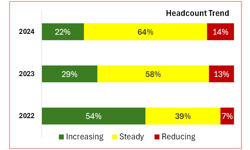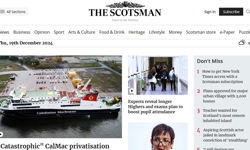It is the bleakest of truisms to say that 2009 will a tough year for everyone in publishing, for reasons too obvious to mention.
The catalogue of bad news is, how shall we describe it, comprehensive.
Who would have imagined a few years ago that the Tribune Company, publishers of the mighty Los Angeles Times, would have to file for protection against bankruptcy, even though the main reason was the fact that new owner Sam Zell saddled the business with $13 billion debt.
And there were not many people who forecast that property advertising in the regional press would suddenly fall off the edge of a cliff.
Or that the value of Trinity Mirror, Johnston Press and David Montgomery’s Mecom would have sunk so low that they crashed out of the FTSE 250 in December.
You can search, in an artificial way, with a magnifying glass for good news and find some.
BBC’s local plans shelved
The lobby against the BBC’s £68 million local web video plans was well-organised and emerged triumphant, much to the annoyance of the BBC management.
The decision by the BBC Trust to block the plans for local expansion is not, as some seem to believe, some cunning BBC ruse to retreat temporarily before pushing ahead again after a decent delay.
Talk to Sir Michael Lyons, the BBC chairman who has spent a lifetime in local government, and he is adamant that the big priority now is to improve the Corporation’s conventional local services on television and radio which he believes are simply not good enough.
Whether this is right or wrong from the BBC’s point of view, that is where any spare money will be deployed.
The BBC has actually got off light - at least by international comparisons. In Holland, the government decided that the public broadcasters should give up 8% of their revenues to support the press.
While Channel 4 has been trying to get some sort of public subsidy, no one has actually suggested that newspapers should get a slice of the BBC licence fee - at least not yet.
For the local commercial media, radio as well as newspapers, at least the threat of well-funded online video news from the BBC has been lifted and as a result an opportunity now opens up.
One newspaper advertising sector at least was booming in the run up to Christmas – supermarkets - as they vied with each other to hold onto market share with discounts and coupons to try to win the retail battle.
Apart from that, until the cycle turns, there is nothing like a bit of schadenfreude to keep everyone cheerful – as in we are all in this together folks, even to some extent, digital advertising.
A survey in December by research group eMarketer suggested that the growth rate in digital media would fall back sharply this year to around 7% and would not recover properly until the Olympic year of 2012.
Small comfort maybe, but reasons for hope, if not actual optimism, rest on firmer foundations and could be seen in the resolute spirit shown at the Society of Editors’ conference in Bristol in November and in the substance of many of the sessions.
Be bold
The new president of the Society, Nigel Pickover, hit exactly the right tone when he called for courage to confront the challenges all media will face this year, while praising the quality of the journalism and storytelling that still shines through, even though some of the stories may have to be told in different ways.
"Don’t be afraid - be adaptable, be hungry, be innovative and enjoy the highs and lows of the best profession around, with journalism at its heart," exhorted the editor of the Evening Star, Ipswich.
Luckily there had been plenty of evidence on display of both adaptability and innovation – and mercifully, fewer signs of hunger.
In a recession, costs may have to be cut to keep expenditure at least roughly in line with realistic revenues. But cost-cutting on its own is a negative, unimaginative and ultimately soul-destroying exercise which can end up damaging the editorial product and therefore its future.
The bold will continue to invest and treat the recession as a stimulus to reorganise operations and make them both more cost-effective and rational.
Multi-media newsrooms
For many, including the Financial Times and the Nottingham Evening Post, that has meant moving to reorganised multi-media newsrooms.
Malcolm Pheby, regional editorial director of the Nottingham Evening Post, was particularly impressive as he related in a matter-of-fact way how "a quiet revolution" had taken place at the paper.
Over the past twelve months, it had created a fully-integrated multi-media newsroom and every journalist was now trained to operate in both print and online.
"The great thing about this for regional newspapers is that having the same journalist working for the newspaper and the website is a completely scaleable and flexible solution according to the needs of any given day," argues Pheby.
True, but regional publishers who argued so vehemently against the BBC adding extensive video to its local websites have now got to go one stage further and prove that they have the appetite and the will to take up the opportunity now being left vacant by the BBC.
If not, then the campaign against BBC local expansion will eventually begin to look merely like a spoiling exercise.
The Financial Times has long had an extensive multi-media presence, but as the paper’s executive editor, Hugh Carnegy, explained in Bristol, the FT’s dot com desk may have been in the newsroom but the two operations had still been running on parallel tracks.
"I guess the overall aim of what we were doing was summed up by trying to make sure we moved away from approaching stories in separate huddles," explained Carnegy.
He did concede however that despite all the organisational changes, it would always be a challenge to manage the different cycles of online and print.
When they looked carefully, one of the problems that emerged at the relatively well-organised FT was that copy was still going through up to eight pairs of hands – duplication of effort that had to be reduced.
What became clear from the experience of those papers that had reorganised their newsrooms, or designed completely new ones like the Guardian, was the absolute need for a clear vision on what you are trying to achieve.
Where’s the ROI?
Once you have got the best, most efficient multi-media newsroom that human ingenuity can achieve, alas the central dilemma remains. How on earth are you going to make any money out of what most people now accept is a necessary investment, a vital transformation?
The problem can be easily stated. Existing UK media institutions are taking, collectively, only an estimated 20% share of online advertising compared to Google’s 40%. There was some useful advice on offer at the Bristol conference from Dietmar Schantin from IFRA, the publishing research and consultancy organisation.
Schantin could point to concrete examples around the world where newspapers had generated additional revenue from special online initiatives.
Austrian newspaper Oberosterreichische Nachrichten, for example, set up a recruitment site that gave advice on interview techniques to potential candidates. At least before the credit crunch, advertisers included insurance and financial services companies.
The Globe and Mail in Canada set up a business incubator feature that included video of executives giving start-up tips. It was sponsored by computer group Cisco.
And the Daily News in the US made $1.6 million through a special site on the New York Yankees which was sponsored by the Bank of America.
What emerged from Schantin’s experience was that it seemed to be easier to make money from specialist add-ons that merged into advertorial, rather than from straight news websites.
The greatest challenge for this year, once the reorganisation of newsrooms has been completed and the plans for news video drawn up, is to try to earn more revenue from the web.
In the case of the remarkable international online reach of the UK national papers, this may require help from specialist agencies.
There is no more important commercial issue to address at the moment than figuring out how to get a "fair" return from the investment in online.
Sub-editors – RIP?
Another issue that could come to the fore this year is the role of the sub-editor.
Will they gradually become an endangered species? Certainly Gavin O’Reilly, chief operating officer of the Independent Media Group, believes that graduate reporters ought to be able to get it right first time without the need for a costly second tier in the production process.
Subs have also been melting away at the Daily Express, though mostly for cost-cutting reasons.
CityAM, the City of London free newspaper, has taken out subs but used the money saved to invest in more reporters.
Those who would get rid of sub-editors entirely have to make sure there is another way of checking accuracy, quality and legal safety, otherwise the result could be entirely counter-productive.
Routine subbing may, however, become a thing of the past.
This could also be the year when the newspaper love affair with the City – if that is not too ludicrous a term - comes to an end.
Newspaper stocks have been hammered partly because of the collapse in advertising revenues and the impact of recession on a cyclical industry. But there has also been a large element of fashion, or rather the lack of it.
Too many young City analysts, in the face of many of the facts, believe that the traditional media is as good as dead and that it’s only a matter of time.
Benign private owners, in the business for the long term, might be a better bet than fighting an unequal battle against plunging stock market share prices.
Looking on the bright side, perhaps by the end of the year, there might be the odd chink of light. Better times will return.
In the meantime, comfort yourself with the Chinese concept of ‘weiji’ which means crisis but is also said to combine elements of both "threat" and "opportunity".
Mandarin specialists insist weiji means no such thing. But, whether linguistically precise or not, it is absolutely the dual concept that publishers should embrace during this difficult year.
FEATURE
Surviving 2009
No one pretends 2009 is going to be easy, but there is no point whingeing and feeling sorry for ourselves. The best thing to do is to use the time wisely and to plan for the upturn, so that when those first green shoots of recovery start to sprout, you will be well placed to capitalise. Ray Snoddy looks at the likely trends for 2009.










